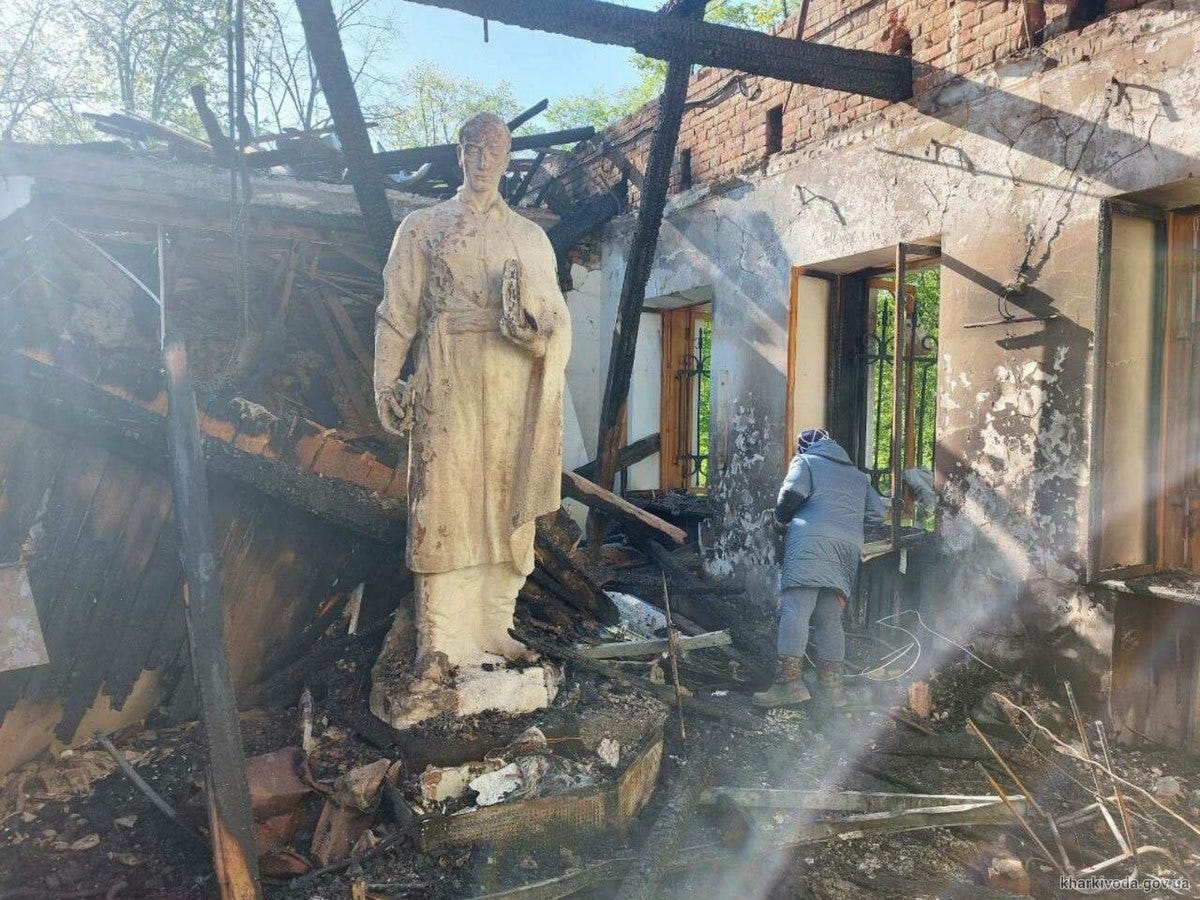Don't Make Ukraine a Casualty of America's Culture Wars
The beleaguered country's backlash against Russian culture is about survival not cancellation

For those parochial enough to see the world through the prism of America’s culture wars, Ukraine’s pushback against Russian cultural domination may appear as yet another example of “wokeness” run amok. After all, Ukrainians are renaming their streets, tearing down monuments erected during centuries of Russian and Soviet rule, and even “canceling” books.
Their latest alleged victim? Elizabeth Gilbert, author of popular memoirs (most prominently Eat, Pray, Love). Her upcoming novel set in 1930s Soviet Russia, The Snow Forest, provoked a flurry of scathing one-star reviews on Amazon, prompting the writer to announce a delay in publication in a Twitter video.
As much as possible, Ukrainians and friends of Ukraine ought to keep their country away from the frontlines of America’s cultural conflicts, which are likely to dominate the upcoming election cycle. But the attempt by those in the U.S. to slap the label of “cancel culture” on Ukraine’s backlash against Russia’s previous cultural and political domination of their country is silly. It conflates related but distinct issues catalyzed by Russia’s war of aggression against Ukraine: the emergence of a strong, civic national identity in Ukraine that involves the showcasing of Ukrainian artistic, musical and literary traditions as distinct from Russian ones; efforts to hold prominent Russian nationals accountable for the depredations of Russian President Vladimir Putin’s regime; and, finally, tactics and communications in making the case for Western support of Ukraine.
Evaluating each of these requires nuance instead of projecting American idiosyncrasies on a country with a different history and cultural sensibilities.
Ukraine’s Inclusive Patriotism
The Russian invasion has no doubt accelerated the rise of modern Ukrainian identity. But this process is not new. It got underway at the time of Ukraine’s independence from what was left of the Soviet Union in 1991—and was greatly boosted by the Orange Revolution of 2004, a spontaneous uprising triggered by public corruption and election fraud, as well as the 2014 Revolution of Dignity (also called Euromaidan) that ejected the Russia-backed, thoroughly corrupt, President Viktor Yanukovych from the country.
But it was Russia’s brazen aggression last year that unified Ukrainians and caused them to coalesce around their nascent liberal democratic institutions. A country long characterized by factionalism and distrust of authority found itself united around its staunch resistance against Russia (almost 90% of Ukrainians, including a majority of ethnic Russians, refuse any territorial concessions to end the war). The war has also led to a sharp rise in measures of interpersonal trust—almost doubling the number of Ukrainians who trust their neighbors from 35% to 62% between 2021 and 2022.
More importantly, in contrast to the Kremlin-promoted fiction of Ukrainian “nationalism” and its putative continuity with the far-right vision of Stepan Bandera, the Ukrainian leader who collaborated with the Nazis against the Soviets in World War II, Ukraine has been charting a way toward a liberal, inclusive patriotism, which transcends ethnic and linguistic lines. Nobody has been questioning the patriotism of Ukraine’s ethnic or linguistic minorities—most prominently its Russian speakers or Tatars. Ukraine’s modern elites, after all, come from disproportionately Russian-speaking milieus and have embraced the Ukrainian language only recently. President Volodymyr Zelenskyy’s first language is Russian, as is that of Defense Minister Oleksii Reznikov, with whom the president shares a Jewish heritage.
Banishing Russian Culture
It is against this background, in which Ukrainians of distinct ethnic and cultural backgrounds have come together, that one needs to judge the seemingly illiberal book bans, the toppling of statues of Russian czars and poets, and the renaming of streets of Ukrainian cities. To a large extent, those are only extensions of a bottom-up change across Ukraine, which has made lifelong Russian speakers embrace Ukrainian and turned them against Russian culture. Countrywide, the proportion of Ukrainian speakers has gone up from 40% to 60% during the war.
Much has been made of Ukrainians purging classic Russian writers from public spaces, school curricula and public libraries. But is it all that hard to understand that victims are not particularly keen to celebrate the cultural icons of an aggressor nation hellbent on destroying it? It takes a lot of chutzpah for any outsider to lecture Ukrainians on continuing to commemorate Russian figures while facing Russian missiles. In a fascinating dispatch from Ukraine on the emergence of Ukraine’s new national identity, the writer Tamar Jacoby quotes from her conversation with the historian Andrii Portnov: “When people are dying every day, when cities are being leveled, [Russian writers] Pushkin and Bulgakov are not neutral anymore. They’re part of the game. They’re fair game.”
That is especially understandable given that under imperial Russian—and later—Soviet rule, the Kremlin’s official policy was to reduce Ukraine to an offshoot of the Russian nation. In pursuit of this goal, Russians used crude propaganda, pointing to Ukraine’s and Russia’s common political origins in the Kievan Rus, as well as coercion—repeatedly outlawing all written works in Ukrainian language in the 19th century, appropriating Ukrainian authors and artists as Russian (Hohol, Chekhov, Malevich, to name a few), and targeting both Ukraine’s elites and ordinary people with genocide in the 1930s.
As a result, Ukrainian contributions to music, literature and the arts have remained almost invisible internationally, perhaps with the exception of a handful of towering figures such as Shevchenko or Leontovych. As Jacoby notes, before the war, 90% of Ukraine’s book market was controlled by Russian publishers and the leading pop music station was called Radio Russia.
As a matter of course, the French government promotes French language and culture through assertive cultural diplomacy, quotas and a host of other measures. Is it all that objectionable for Ukrainians, the Ukrainian government and friends of Ukraine to do the same, given the systematic campaign of cultural erasure that Ukraine has experienced in the past? That’s the light in which one should understand both Ukraine’s domestic policies seeking to “decolonize” Ukraine’s curricula and book markets as well as the Ukrainian pressure on artistic and creative institutions around the world to extend the same treatment to Ukrainian works as has been afforded to Russian ones for decades.
It is equally reasonable for cultural and sports institutions in the West, together with parts of their audiences, to turn against prominent Russian figures who have either expressly supported Putin—such as hockey player Alex Ovechkin and conductor Valery Gergiev—or have offered half-hearted equivocations in response to the war, such as opera singer Anna Netrebko. Nobody is entitled to a place in the National Hockey League or on the stage of New York’s Metropolitan Opera.[AS1]
Where Ukrainians Are Overreaching
Can demands for accountability go too far? Of course. Most seriously, perhaps, overreach can do damage to the Ukrainian cause by turning off otherwise sympathetic constituencies. Consider the backlash against last year’s Nobel Peace Prize shared among three Ukrainian, Belarusian and Russian human rights activists and groups. While none of the recipients could have been charged with sympathies for the Kremlin, some Ukrainians believed that the decision detracted from the centrality of the Ukrainians’ suffering. In the same vein, Russian opposition figures—most prominently Alexei Navalny, the dissident whom Putin first tried to poison and was then thrown in jail, but who has made appeals to Russian nationalism in the past—are the subject of scorn in Ukraine.
The emotion behind such gestures may be understandable—Ukrainians, after all, are fighting for survival. However, Ukraine’s cause would admittedly be served better by a wider rather than a narrower international coalition supporting its interests—including Russians who are opposed to Putin and to Russia’s war of aggression. Ukrainian demands of purity and litmus tests of prospective allies and friends of Ukraine, especially in the U.S. context, play into the hands of those who would like to drag the support for Ukraine into the middle of America’s culture wars.
Gilbert’s Self-Absorbed Self-Cancellation
In that context, Gilbert’s self-cancellation is unfortunate. The reason has little to do with Gilbert herself or with the qualities of her novel. For one, it would be grotesque to focus on her loss or supposed victimization at a time when millions of Ukrainian civilians are displaced and hundreds of them are dying every week. Moreover, Gilbert has agency, and her “cancellation” was largely of her own making—even an overreaction, one might say. If anything, she has done a disservice to liberal values (and the cause of Ukraine) by retracting the book instead of mounting a compelling case for why her book was in no way an endorsement of Putin’s or Stalin’s regimes, or of Russian imperialism at large. In fact, the opposite.
By caving in and following a template familiar from numerous earlier instances of social media-driven self-cancellations, Gilbert has inadvertently given ammunition to those arguing that there is something inherently “woke” or “progressive” about support for Ukraine. There are many on America’s right for whom such anecdotes—together with images of, say, the Swedish climate change activist Greta Thunberg meeting with President Zelenskyy in Kyiv—are enough to forget that aid to Ukraine is simply a matter of support for a country’s right to defend itself in the face of external aggression.
The political right in the United States stands already divided on this issue. It would be disastrous—for Ukraine, for European security and for America’s standing in the world—if the Republican Party settled on an anti-Ukraine position going into the 2024 election cycle. It would be particularly tragic, moreover, if such an outcome were a by-product of our inane culture wars.
© The UnPopulist 2023
Follow The UnPopulist on Twitter (@UnPopulistMag) and Facebook.






Not everything happening in Ukraine at the moment is good nor optimal. There are people supporting Bandera's ideas and most Ukrainians do not trust political parties. At the same time, Ukraine can develop towards the 2030s into a much better, more free and open society compared to how things were before 2015. Freedom is a work in progress, both during war and peace.
The article seems pretty hypocritical to me. Anybody who's been following the "culture war" in the West should be well-aware that the logic that the author of this article used to justify the Ukrainian purging of Russian literature, art, etc is the same logic used be leftists in the culture war.
Leftists claim that these ideas that they consider to be anathema are "literally violence". And if you question that statement, you should be canceled and have your own literature burned, metaphorically speaking.
In essence, the justification used in this article is the same, and that's why it's an inevitability that the Ukraine situation falls into the "culture war" of the West.
Finally, if I may point out, I couldn't help but get the vibe that, in this article, burning books and art work is perfectly acceptable if it's approved by the likes of those who contribute to the unpopulist. I mean, is it not "perfectly understandable" that "populists" would rather not have their children be exposed to pornographic materials in schools? I'm just curious, because, after all, it seems that the people of the unpopulist bent are totally against burning those books.
Ultimately, burning Russian books (no matter how beautiful and valuable) good because war, burning pornographic books from schools bad because... Acceptance?
Like... What?